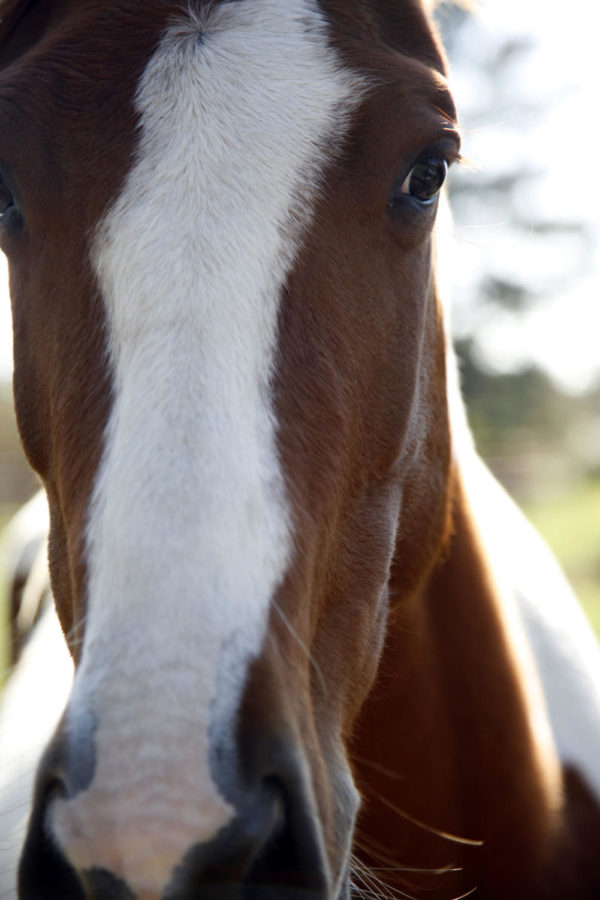Brown: A horse is a horse, of course, of course
Photo courtesy of Flickr/michael fontenot
Opinion: Brown 11/29
November 29, 2012
A horse is a horse, of course, of course.
Or, at least, so said the theme song for “Mr. Ed.” People around the country and around the world have very contentious views on what being a horse means, however.
A great many people view horses as inherently different than other livestock, garnering a greater respect than animals such as donkeys and cattle. Just looking at product lines such as “My Little Pony” can attest to this, not to mention claims such as that of New Mexico Attorney General Gary King, who said, “Horses are different and should be treated differently.” King was speaking in regard to a horse slaughterhouse proposal in Roswell, N.M.
Horse slaughter, or the harvesting of horse meat for human consumption, strikes a great many people as wrong, in fact. A 2006 Public Opinion Strategies poll showed that 69 percent of Americans surveyed did not approve of human consumption of horse meat. The poll also found that 71 percent of those surveyed thought horses were “a part of America’s culture” and should not be treated as livestock.
Horses, historically speaking, were not raised because they make good friends. They were a beast of burden used for travel, as a farming and ranching tool, for sporting events, and yes, even for food.
There have even been some claims that horses are uniquely unsuited for slaughter. As the ASPCA said in a February 2012 press release, the “biology of horses makes them difficult to stun.” Who could argue against such compelling “science”?
Certainly, there were some real problems with horse slaughter in the United States. In 2007, the last remaining horse-processing plant in America was closed down, due to local disapproval and heavy pressure from national animal rights groups. Until that plant was closed, there was strong evidence for mistreatment of horses in the United States.
Horses all over the nation were underfed, many were not given adequate health care, some were transported inhumanely, and a great many others were generally neglected and abused. Thankfully, when we finally came to our senses and stopped treating horses like meat, all of this stopped.
Oh wait. It didn’t.
Despite the complete lack of horse slaughter within the United States today, horses are still being mistreated. The Humane Society of the United States acknowledges that with respect to criminal neglect charges, the most common way to take action against animal cruelty, horses comprised 7 percent of cases in 2007, after U.S. horse slaughter was stopped, 6 percent in 2006, and 8 percent in 2005.
Current figures available at www.pet-abuse.com show that horses comprise 1,096, or 14 percent, of the 7,627 recent cases of animal neglect/abandonment.
This does not mean that the end of horse slaughter in the United States necessarily caused a flood of mistreated horses, but it also does not point to horse slaughter as the cause of horse abuse. Claims that allowing horses to be used for human consumption in the United States encourages their mistreatment and promotes abusive ownership simply have not been proved true.
Yet that is the impetus for the numerous legislative proposals that would legally ban horse slaughter in the United States. Proponents such as the Humane Society cite numerous cases of mistreatment found while horse slaughter was occurring, commonly while horses were being transported for slaughter.
Such transport does not end with a nationwide ban on horse slaughter, though. Every year horses are transported to slaughterhouses located on the borders of Canada and Mexico, which buy American horses and sell the meat to overseas buyers. Many of these slaughterhouses have been found to use less-than-humane techniques in killing their stock.
That would be a very good reason to argue against slaughterhouses in the United States, except any slaughterhouses here would be regulated by our government. Any instances of inhumane practices could actually be addressed, as they cannot be currently.
All occurrences of animal abuse are terrible, terrible things. Animal cruelty is a disgusting reality, but it is just that — a reality. Banning the human consumption of horse meat and the regulated slaughter of horses does not change it.







